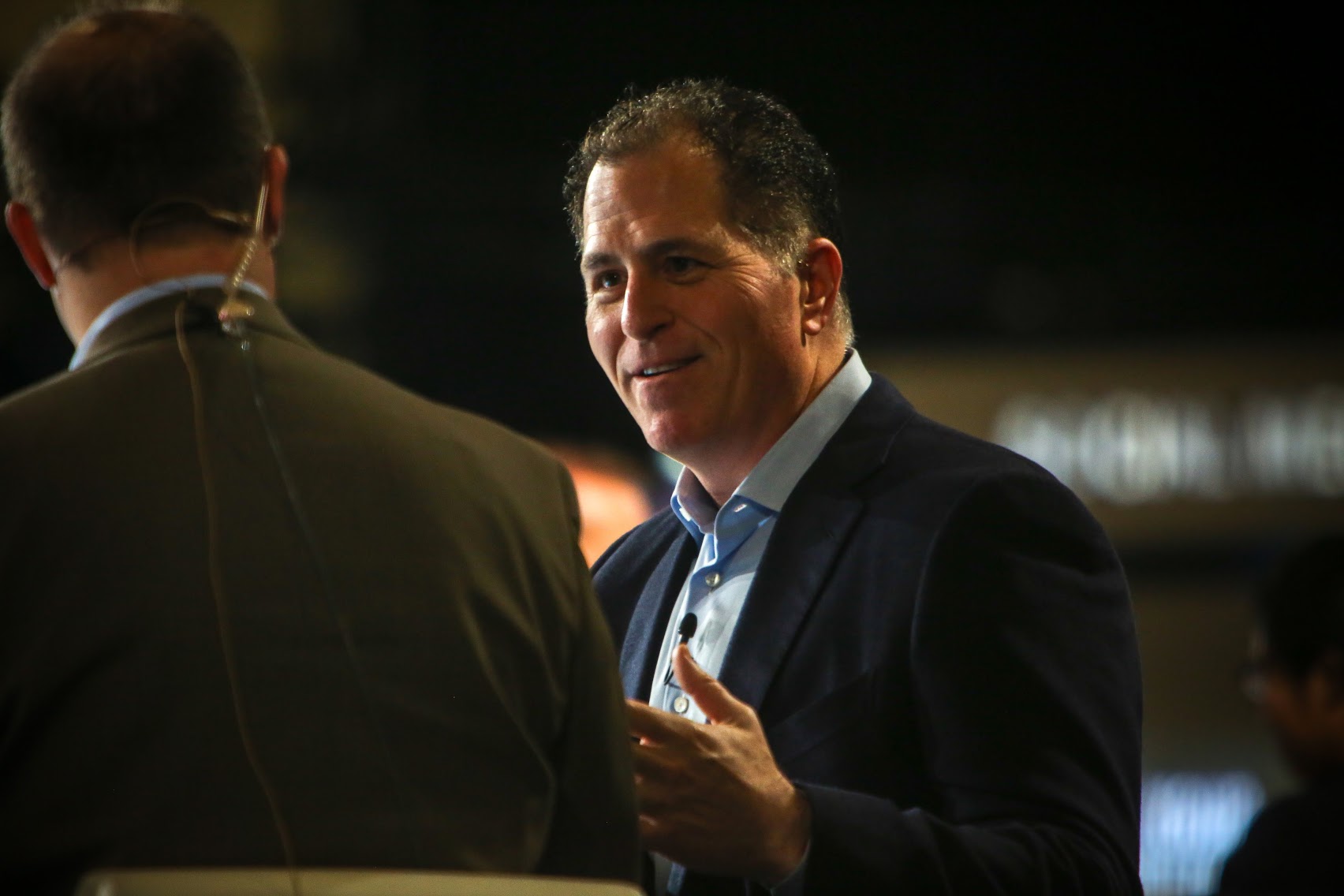 CLOUD
CLOUD
 CLOUD
CLOUD
 CLOUD
CLOUD
The curious transformation of Dell Technologies Inc. began with a decision to go private, scaling down to become a more agile player in the cloud computing era. Yet the subsequent merger with EMC Corp.’s federation of storage and virtualization products meant that Dell was once again a massive company subject to slowed innovation, with the added task of integrating companies and cultures.
Amid the dizzying developments these past few years, Dell founder and Chief Executive Officer Michael Dell (pictured) has been steadfast in his vision of a hybrid cloud amid intense competition from public cloud providers such as Amazon Web Services Inc.
“When you’re winning, everyone is excited and engaged,” said Dell, speaking on the growing confidence Dell EMC employees experienced as the results of the merger begin to show. Sitting down for a live interview at Dell Technologies World 2018 today, Dell talked with Stu Miniman, host of theCUBE, SiliconANGLE Media’s mobile livestreaming studio, about his efforts behind the massive merger, the resulting market growth in datacenter clients and where he sees his company in 2020. (* Disclosure below.)
The most recent, major development at Dell Technologies is the launch of an initial public offering for its majority-owned Pivotal Software Inc., a strategic move to raise capital for paying down the debt underlying the EMC acquisition. Although the IPO represents one of many changes at Dell Technologies, Dell sees it as net positive.
“Revenues are much stronger than we thought,” said Dell, citing the successful integration of Dell EMC’s family of businesses. “Particularly with VMware and Pivotal … the relevance of what we’re doing has never been greater. We’re able to have conversations with customers we weren’t able to have before.”
Certainly, Dell has benefited from its broadened product portfolio. The International Data Corp. puts Dell EMC at the top of hyperconverged infrastructure, reporting a 28 percent market share for the fourth quarter of 2017, putting its year-over-year growth at 138 percent. Dell has also surpassed Hewlett Packard Enterprises Co. in server revenue, according to Gartner Inc.’s latest figures released in March, with shipments up almost 9 percent for the fourth quarter of 2017.
Yet how is Dell navigating its expansive product portfolio as market rivals, including AWS, Microsoft Azure and Google Cloud, all layer in their own software services? Cloud infrastructure providers seem all too eager to boost infrastructure offerings with intelligent systems and baked-in machine learning capabilities, and Dell is no exception.
“There’s some simplification and optimization of capabilities,” Dell said of his efforts to streamline the bevy of product offerings. “You’ll see us not only create a seamless, logical path for every customer, but rally around the winning platforms.”
So far those winning platforms are heavily focused on VMware-ready solutions, as Dell called out the Vx family of hyperconverged appliances and software. VMware Inc. has been key to Dell’s recent growth, accounting for an increasing percentage of total revenue at Dell Technologies.
“There’s a portfolio effect where customers look across everything we’re doing and say, ‘I don’t want to deal with 25 little companies. I want to have a bigger relationship with Dell Technologies,’” Dell said.
At this year’s conference, Dell announced a revamped Dell EMC PowerMax storage system with a built-in, real-time machine learning engine for automated, intelligent storage. The company also updated its XtremIO all-flash arrays, optimized for lowered bandwidth and storage requirements. To further support hyperconverged cloud environments, the Dell EMC VxRail has also been upgraded for lower latency and higher performance.
“Right now it looks great, and it will look even better in 2020,” said Dell, ever-confident in the endgame for Dell EMC’s ongoing transformation. “We’ve positioned ourselves as the central infrastructure company. We’re on the [network] edge, have a distributed core.”
At the core of all this, he added, is the data and computer science.
“AI is eating software. Software is eating hardware,” he said. “AI doesn’t run on software. Software doesn’t run on software. They run on hardware,” Dell said.
Here’s the complete video interview, and there’s much more coverage of the Dell Technologies World 2018 from theCUBE and SiliconANGLE. (* Disclosure: Dell Technologies Inc. sponsored this and other selected segments of theCUBE to underwrite coverage of the event. Neither Dell Technologies nor other sponsors have editorial control over content on theCUBE or SiliconANGLE.)
Support our open free content by sharing and engaging with our content and community.
Where Technology Leaders Connect, Share Intelligence & Create Opportunities
SiliconANGLE Media is a recognized leader in digital media innovation serving innovative audiences and brands, bringing together cutting-edge technology, influential content, strategic insights and real-time audience engagement. As the parent company of SiliconANGLE, theCUBE Network, theCUBE Research, CUBE365, theCUBE AI and theCUBE SuperStudios — such as those established in Silicon Valley and the New York Stock Exchange (NYSE) — SiliconANGLE Media operates at the intersection of media, technology, and AI. .
Founded by tech visionaries John Furrier and Dave Vellante, SiliconANGLE Media has built a powerful ecosystem of industry-leading digital media brands, with a reach of 15+ million elite tech professionals. The company’s new, proprietary theCUBE AI Video cloud is breaking ground in audience interaction, leveraging theCUBEai.com neural network to help technology companies make data-driven decisions and stay at the forefront of industry conversations.